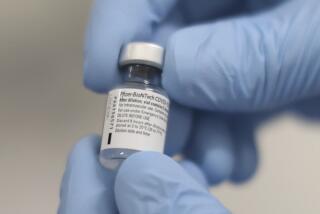UCLA Gets OK to Test AIDS Drug : Medicine: The new product may help reduce transmission of the virus from infected pregnant women to their fetuses. Clinical trials have been delayed by liability concerns.
- Share via
A long-delayed clinical trial to test a new drug’s ability to prevent the transmission of the AIDS virus from infected pregnant women to their fetuses has finally begun, the study’s co-director, Dr. E. Richard Stiehm of UCLA, said Monday.
The drug is a preparation of antibodies from the blood of adults who have contracted the human immunodeficiency virus (HIV) but who do not yet have symptoms.
Trials of the drug, called HIVIG, were to have begun last summer but were postponed when the manufacturer, Abbott Laboratories, refused to supply it. Abbott cited fears about its potential liability if some newborns were infected as a result of the trial.
Threatened with a lawsuit by the American Civil Liberties Union because they had promised to supply HIVIG, Abbott this June unconditionally released the rights to HIVIG to another company, North American Biologicals of Miami, which will supply it. The researchers are now starting over in their quest to recruit subjects, Stiehm said.
In the United States, an estimated 5,400 pregnant women are infected with HIV each year, and about one-third of their newborns are also infected. Eighty percent of childhood AIDS arises from this source. The U.S. Centers for Disease Control and Prevention estimates that about 3,500 children in the country have AIDS and another 7,000 to 10,000 are HIV positive.
Researchers hope that HIVIG will help reduce those numbers. “This is one of the more promising therapies we have had in the past several years to prevent maternal-fetal transmission of HIV,” Stiehm said. Earlier studies showed that the treatment blocked maternal transmission of the virus in chimpanzees.
The new study is unique in that “it represents one of the first concerted efforts to try to bolster the immune system’s own response to HIV . . . rather than to attack the virus with an anti-viral drug alone,” said Dr. Claude Lenfant, director of the National Heart Lung and Blood Institute, which is sponsoring the trial in cooperation with two other units of the National Institutes of Health.
The new study was inspired, Lenfant said, by recent research showing that hepatitis B antibodies, or immune globulins, can reduce transfer of that virus from chronically infected mothers to their offspring. That is a hopeful sign because, as is the case with HIV, people never recover from a hepatitis B infection, he said. Instead, the virus lies hidden in the body, ready to break out when triggered by events that are as yet unclear.
HIVIG is prepared from blood plasma donated by selected donors who carry the AIDS virus but have no symptoms of AIDS. These donors must have a high CD4+ lymphocyte count to demonstrate that their immune systems have not been compromised by the disease. The preparation of HIVIG includes several steps to ensure that HIV and other viruses the blood might contain are killed.
The trial will enroll and monitor 400 women at UCLA and 39 other centers around the country. All the subjects will have AIDS and will already be receiving the anti-AIDS drug AZT.
Women will be enrolled between the 20th and 30th weeks of pregnancy. All will continue to receive AZT. Half will receive monthly injections of HIVIG and the other half will receive immune globulin from non-HIV-positive donors as a control. Within 12 hours after their birth, the infants will receive the same immune globulin as their mothers. They will also receive AZT for six weeks.
The trial is planned to last two years. Mothers who wish to enroll can call (800) TRIALS-A; locally, (310) 206-6369.






